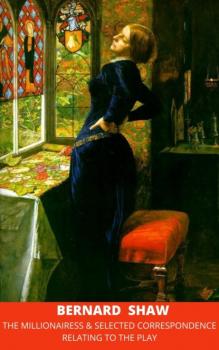Bernard Shaw
Список книг автора Bernard ShawPress Cuttings
"Press Cuttings" by Bernard Shaw. Published by Good Press. Good Press publishes a wide range of titles that encompasses every genre. From well-known classics & literary fiction and non-fiction to forgotten−or yet undiscovered gems−of world literature, we issue the books that need to be read. Each Good Press edition has been meticulously edited and formatted to boost readability for all e-readers and devices. Our goal is to produce eBooks that are user-friendly and accessible to everyone in a high-quality digital format.
Candida: Ein Mysterium in drei Akten
"Candida: Ein Mysterium in drei Akten" von Bernard Shaw (übersetzt von Siegfried Trebitsch). Veröffentlicht von Good Press. Good Press ist Herausgeber einer breiten Büchervielfalt mit Titeln jeden Genres. Von bekannten Klassikern, Belletristik und Sachbüchern bis hin zu in Vergessenheit geratenen bzw. noch unentdeckten Werken der grenzüberschreitenden Literatur, bringen wir Bücher heraus, die man gelesen haben muss. Jede eBook-Ausgabe von Good Press wurde sorgfältig bearbeitet und formatiert, um das Leseerlebnis für alle eReader und Geräte zu verbessern. Unser Ziel ist es, benutzerfreundliche eBooks auf den Markt zu bringen, die für jeden in hochwertigem digitalem Format zugänglich sind.
Man kann nie wissen: Komödie in vier Akten
"Man kann nie wissen: Komödie in vier Akten" von Bernard Shaw (übersetzt von Siegfried Trebitsch). Veröffentlicht von Good Press. Good Press ist Herausgeber einer breiten Büchervielfalt mit Titeln jeden Genres. Von bekannten Klassikern, Belletristik und Sachbüchern bis hin zu in Vergessenheit geratenen bzw. noch unentdeckten Werken der grenzüberschreitenden Literatur, bringen wir Bücher heraus, die man gelesen haben muss. Jede eBook-Ausgabe von Good Press wurde sorgfältig bearbeitet und formatiert, um das Leseerlebnis für alle eReader und Geräte zu verbessern. Unser Ziel ist es, benutzerfreundliche eBooks auf den Markt zu bringen, die für jeden in hochwertigem digitalem Format zugänglich sind.
Der Mann des Schicksals: Komödie in einem Akt
"Der Mann des Schicksals: Komödie in einem Akt" von Bernard Shaw (übersetzt von Siegfried Trebitsch). Veröffentlicht von Good Press. Good Press ist Herausgeber einer breiten Büchervielfalt mit Titeln jeden Genres. Von bekannten Klassikern, Belletristik und Sachbüchern bis hin zu in Vergessenheit geratenen bzw. noch unentdeckten Werken der grenzüberschreitenden Literatur, bringen wir Bücher heraus, die man gelesen haben muss. Jede eBook-Ausgabe von Good Press wurde sorgfältig bearbeitet und formatiert, um das Leseerlebnis für alle eReader und Geräte zu verbessern. Unser Ziel ist es, benutzerfreundliche eBooks auf den Markt zu bringen, die für jeden in hochwertigem digitalem Format zugänglich sind.
Fanny's First Play
"Fanny's First Play" by Bernard Shaw. Published by Good Press. Good Press publishes a wide range of titles that encompasses every genre. From well-known classics & literary fiction and non-fiction to forgotten−or yet undiscovered gems−of world literature, we issue the books that need to be read. Each Good Press edition has been meticulously edited and formatted to boost readability for all e-readers and devices. Our goal is to produce eBooks that are user-friendly and accessible to everyone in a high-quality digital format.
The Millionairess & Selected Correspondence Relating to the Play
The selected correspondence of Bernard Shaw relating to the play The Millionairess contains 37 letters, written between 1934 and 1949. The book represents a significant addition to present-day understanding of the play The Millionairess. It reveals views of Shaw on a wide variety of issues and his relationships with contemporaries. The play The Millionairess was written in 1935. The first English edition was published on 24 March 1936 by Constable and Company Ltd, London (The Simpleton, The Six, And The Millionairess: Being Three More Plays). This publication is a handmade reproduction from this edition, and remains as true to the original work as possible. The original edition was processed manually by means of a classic editing which ensures the quality of publications. Here are some inspirational book quotes from Bernard Shaw: «The Millionairess is a play with a very strong part for a female star, and, if you can get the right woman, it will be a moneymaker and cover [your wife] Tina with diamonds. It is, however, a star play in respect of its dependence on a single actress with a very heavy part and a termagant personality. If they have found the right woman for Epifania, and she sticks faithfully to her part as I have written it, it will be a success; and you will make some money. Unless it is pure Shaw, it is doomed. If they alter a single word or incident in The Millionairess they shall never have another play of mine to murder. I have not written a potboiler since The Apple Cart; and I must make some money out of The Millionairess or drop the theatre. The successes in Vienna, Prague, and now in Milan and Rome are hopeful; and I ought to strike while the iron is lukewarm. I have a young and beautiful Epifania raging to play the part: Her name is Leonora Corbett. I have not had a potboiler since The Apple Cart; and as all my debentures and mortgages were paid off during the slump and my investments in crematoria have not yet fructified I am banking a little on The Millionairess to make me a millionaire. Eppy speech should be peculiar to herself; but she must not be a stage foreigner, as that lingo is always grossly incorrect. She is exotic and essentially tragic all through. In the original version I made the woman a boxer; but, on the stage, that was unconvincing and unladylike. So I have made her a Judo expert. The part requires just such a personality as Miss Hepburn.»
The book also includes an editor's note to German readers.
Widowers' Houses & Selected Correspondence Relating to the Play
The selected correspondence of Bernard Shaw relating to the play Widowers' Houses contains 160 letters and entries written between 1885 and 1933. This publication from a revised edition Plays: Pleasant and Unpleasant. The First Volume, Contain-ing the Three Unpleasant Plays (Widowers' Houses, The Philandered, & Mrs Warren's Profession) published by Constable and Company Ltd, London 1919 is a handmade reproduction from the original edition, and remains as true to the original work as possible. The original edition was processed manually by means of a classic editing which ensures the quality of publications and the unrestricted enjoyment of reading. Here are some inspirational book quotes from Bernard Shaw: 'I do not hesitate to say that many of my critics have been completely beaten by the play simply because they are ignorant of society.' 'Now, the didactic object of my play is to produce conviction of sin, to make the Pharisee who repudiates Sartorius as either a Harpagon [a character of a comedy The Miser by the French playwright Molière] or a diseased dream of mine, and thanks God that such persons do not represent his class, recognize that Sartorius is his own photograph.' 'These gentlemen believe that, according to me, what is wrong with society is that the rich, who are all wicked, oppress the poor, who are all virtuous. I will not waste the space of The Star by dealing with such a misconception further than to curtly but goodhumoredly inform those who entertain it that they are fools.' 'Unfortunately I have no power of producing beauty: my genius is the genius of intellect, and my farce its derisive brutality.'
How He Lied to Her Husband & Selected Correspondence Relating to the Play
The selected correspondence of Bernard Shaw relating to the play How He Lied to Her Husband contains 32 letters and entries, written between 1898 and 1949. The book represents a significant addition to contemporary understanding of Shaw's play How He Lied to Her Husband. It reveals his thoughts on a wide variety of issues and relationships with contemporaries. The play How He Lied to Her Husband was first published in a translation by Siegfried Trebitsch on 28 November 1904 in the Berliner Tageblatt. First English edition was published on 19 June 1907 by Constable and Company Ltd, London. This publication from «John Bull's Other Island and Major Barbara: also How He Lied to Her Husband, Constable and Company Ltd, London, 1920» is a handmade reproduction from the original edition, and remains as true to the original work as possible. The original edition was processed manually by means of a classic editing which ensures the quality of publications and the unrestricted enjoyment of reading. Here are some book quotes from Bernard Shaw: « The German papers seem to have settled into a habit of reporting everything I do as a failure.» «All I can say is that the film How He Lied to her Husband directed by Cecil Lewis is the opening item in the program of the Carlton, which is a first rate London cinema. Although the principal film, to which mine is only a lever de rideau attracts the wrong sort of audience for my work, the people laugh at it as much as cinema audiences ever laugh (or perhaps a bit more) and it is kept in the bill. It has just been produced in America. Consequently the illiterate reporters who have never heard any language but Hollywood American, nor any colloquialisms, and who were mentally incapable of sustained attention, complained bitterly and just hated it. The qualified literate critics were all quite civil…»
The book also includes an editor's note to German readers.
Candida & Selected Correspondence Relating to the Play
The selected correspondence of Bernard Shaw relating to the play Candida contains 249 letters and entries, written between 1889 and 1950. The book represents a significant addition to modern-day understanding of Shaw's play Candida and reveals his thoughts on a wide variety of issues, love affairs und relationships with contemporaries. This publication from a revised edition Plays: Pleasant and Unpleasant. By Bernard Shaw. The Second Vol-ume, containing the four Pleasant Plays published by Constable and Company Ltd., London: 1920 is a hand-made reproduction from the original edition, and remains as true to the original work as possible. The original edition was processed manually by means of a classic editing which ensures the quality of publications and the unrestricted enjoyment of reading. Here are some inspirational book quotes from Bernard Shaw: «The play, which is called Candida, is the most fascinating work in the world.» «I have written THE Mother Play—»Candida"—and I cannot repeat a masterpiece." «I shall never be able to begin a new play until I fall in love with somebody else.» «I assure you in all unhumility I am the greatest dramatist of the XX century.» «There is a Shaw boom on in Germany, because four of my plays have been produced in Vienna, Leipzig, Dresden and Frankfurt.» «But I want the Germans to know me as a philosopher, as an English (or Irish) Nietzsche only ten times cleverer.» «And remember that though we may be no bigger men than Goethe and Schiller, we are standing on their shoulders, and should therefore be able to see farther & do better. And after all, Schiller is only Shaw at the age of 8, and Goethe Shaw at the age of 32.» «I am never wrong. Other people are sometimes—often—nearly always wrong, especially when they disagree with me; but I am omniscient and infallible.» «Until within the last few months, when the success of Fraulein Agnes Sorma as Candida in Berlin was followed by an outbreak of Candidamania in New York, I had nothing to shew in the way of a successful play.» «But everybody likes Candida. Wyndham drops a tear over Candida; Alexander wants the poet made blind so that he can play him with a guarantee of 'sympathy'; Mrs Pat wants to play Candida; Ellen Terry knows she is Candida; Candida is everybody's play except the utter groundlings.» «But I dread success. To have succeeded is to have finished one's business on earth, like the male spider, who is killed by the female the moment he has succeeded in his courtship. I like a state of continual becoming, with a goal in front and not behind. I am a magnificently successful man myself, and so are my knot of friends but nobody knows it except we ourselves…» The book also includes an editor's note to German readers.
Major Barbara & Selected Correspondence Relating to the Play
The selected correspondence of Bernard Shaw relating to the play Major Barbara contains 178 letters and entries, written between 1891 and 1950. This publication from «John Bull's Other Island and Major Barbara: also How He Lied to Her Husband, Constable and Company Ltd, London, 1920» is a handmade reproduc-tion from the original edition, and remains as true to the original work as possible. The original edition was processed manually by means of a classic editing which ensures the quality of publications and the unrestricted enjoyment of reading. Here are some inspirational book quotes from Bernard Shaw: 'When all the world goes mad, one must accept madness as sanity, since sanity is, in the last analysis, nothing but the madness on which the whole world hap-pens to agree.' 'Marx's «Capital» is as amateurish in its abstract economics as Ruskin's Munera Pulveris, or, for the matter of that, as Adam Smith's Wealth of Nations; but for all that it is one of the books that has changed the mind of the world.' 'I do not say that my books and plays cannot do harm to weak or dishonest people. They can, and probably do. But if the American character cannot stand that fire even at the earliest age at which it is readable or intelligible, there is no future for America.' 'Now I want to make a suggestion to the press. I dont ask them to give up abusing me, or declaring that my plays are not plays and my characters not human beings. Not for worlds would I deprive them of the inexhaustible pleasure these paradoxes seem to give them. But I do ask them, for the sake of the actors and of Vedrenne and Barker's enterprise, to reverse the order of their attacks and their caresses. In the future, instead of abusing the new play and praising the one before, let them abuse the one before and praise the new one.' 'I regard a writer who is convinced that his views are right and sound as a very dangerous kind of lunatic. He is to be found in every asylum; and his delusion is that he is the Pope, or even a higher authority than the Pope.' 'All the faithful I have known have been rough and unsympathetic at times, all the charming persons I have known have been faithless in some of the relations of life.' 'An educated man, according to the old formula, is one who knows everything of something or something of everything.' 'But would anyone but a buffle headed idiot of a university professor, half crazy with correcting examination papers (another infamous activity pursued under economic pressure) immediately shriek that all my plays were written as economic essays, and that I did not know that they were plays of life, character, and human destiny as much as Shakespear's or Euripides's?' 'My plays are miracles of dramatic organization because I have never constructed them: there is not an ounce of dead wood in them: every bit of them is alive for somebody. To me constructed plays are all dead wood, bearable only for the sake of such scraps of sentiment or fun or observation as the artificer has been able to stick on them.' 'The cost of getting old is that one does and says things without realising what effect they may have on other people or oneself.' 'There is a point at which continuous successes will make a man believe that he can achieve anything.' 'I have honor and humanity on my side, wit in my head, skill in my hand, and a higher life for my aim.' 'It is not the story that matters but the way it is told.'









